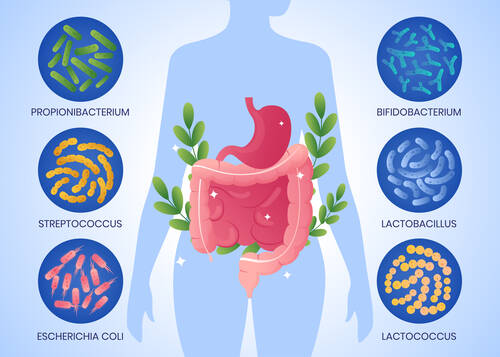
14 Feb Why Your Gut Feelings Are Actually in Your Gut: The Microbiome-Mood Connection
That nervous feeling in your stomach before a big presentation isn’t just a figure of speech. Groundbreaking research reveals your gut functions as a “second brain,” dramatically influencing your mood, anxiety levels, and even decision-making abilities.
The Hidden Conversation Between Gut and Brain
Your digestive system contains over 100 million neurons – more than your spinal cord. This extensive neural network, called the enteric nervous system, communicates directly with your brain through the vagus nerve, creating a two-way street of chemical messages that affect everything from stress levels to emotional resilience.
Recent studies show that 90% of serotonin, often called the “happiness hormone,” is produced in your gut, not your brain. This explains why digestive issues often accompany anxiety and depression, and why dietary changes can sometimes be as effective as traditional treatments for mood disorders.
How Your Diet Shapes Your Mental Health
What you eat doesn’t just affect your waistline – it fundamentally alters your brain chemistry.
Here’s how:
The Good Guys
Certain foods promote beneficial gut bacteria that produce mood-boosting compounds:
- Fermented foods like kimchi and yogurt
- Fiber-rich vegetables and legumes
- Omega-3 fatty acids found in fish
- Polyphenol-rich dark chocolate and berries
The Troublemakers
Other foods can trigger inflammation and disrupt your gut-brain balance:
- Processed sugars
- Industrial seed oils
- Artificial sweeteners
- Refined carbohydrates
Building Mental Fitness Through Gut Health
At EXODUS Counseling Services, we understand that mental wellness requires a holistic approach. Traditional counseling combined with lifestyle and dietary guidance often produces better outcomes than either approach alone.
Practical Steps for Better Gut-Brain Health
- Start with a “Reset Week”
- Eliminate major inflammatory foods
- Increase fiber intake gradually
- Add fermented foods daily
- Track mood changes alongside dietary changes
- Build New Habits
- Eat meals at consistent times
- Chew food thoroughly
- Stay hydrated
- Limit alcohol consumption
- Monitor Your Response
- Keep a food-mood journal
- Note energy levels
- Track sleep quality
- Record emotional patterns
The Science Behind the Connection
Research from leading institutions shows that gut bacteria influence:
- Stress hormone production
- Neurotransmitter balance
- Inflammation levels
- Immune system function
These factors directly impact anxiety levels, depression risk, and emotional resilience.
When to Seek Professional Help
While dietary changes can significantly impact mental health, professional guidance often provides crucial support. Signs you might benefit from additional help include:
- Persistent mood changes
- Chronic digestive issues
- Anxiety that affects daily life
- Difficulty maintaining healthy habits
Please discuss any mental and digestive health issues with your health care provider.
The Path Forward
Understanding the gut-brain connection opens new possibilities for mental wellness. By combining traditional counseling approaches with evidence-based nutritional strategies, EXODUS Counseling Services helps clients build both mental and physical resilience.
Remember: Just as your gut influences your mind, positive mental practices can improve digestive health. This two-way relationship means improvements in either area can create an upward spiral of better overall health.
Want to learn more about how nutrition affects your mental health? Contact EXODUS Counseling Services to discuss our holistic approach to emotional wellness.
More information:
- If you or someone you know is struggling or in crisis, help is available. Call or text 988 or chat at org. To learn how to get support for mental health, drug or alcohol conditions, visit FindSupport.gov. If you are ready to locate a treatment facility or provider, you can go directly to FindTreatment.govor call 800-662-HELP (4357).
- S. veterans or service members who are in crisis can call 988 and then press “1” for the Veterans Crisis Line. Or text 838255. Or chat online.
- The Suicide & Crisis Lifeline in the U.S. has a Spanish language phone line at 1-888-628-9454 (toll-free).
The information on MedicalResearch.com is provided for educational purposes only, and is in no way intended to diagnose, cure, or treat any medical or other condition.
Some links are sponsored. Products, supplements, and programs are not warranted or endorsed.
Some supplements can increase or decrease the risk of blood clots so be sure to tell your provider any and all supplements you may be taking or considering taking.
Always seek the advice of your physician or other qualified health and ask your doctor any questions you may have regarding a medical condition. In addition to all other limitations and disclaimers in this agreement, service provider and its third party providers disclaim any liability or loss in connection with the content provided on this website.
Last Updated on February 14, 2025 by Marie Benz MD FAAD
